新课标高中英语选修6 Unit4 核心词汇
新教材高中英语选修6Unit 4 Global warming

赶上
②catch up with
赶上
③end up with
以……结束
④come up with
提出
⑤put up with
忍受;容忍
⑥be fed up with
受够了
2.“be+v.-ed+to”短语荟萃
①be opposed to
反对;与……对立
②be attached to
附属于
③be accustomed to
习惯于
④be addicted to
沉溺于
⑤be devoted to
奉献
⑥be sentenced to
被判处
(三)重点句式——背熟巧用
句型公式
教材原句
句型 1:There is no
doubt that...毫无疑
_T__h_e_r_e_i_s_n_o__d_o_u_b_t_t_h_a_t_ the earth is becoming warmer... 毫无疑问,地球正在变暖……
long as 意为 — if not, turn it off!
“只要”,引 只要你在使用电器设备,你就可以让它开着——如果不用,就把它关
导条件状语从 掉!
句
It is OK to leave an electrical appliance on so long as you are using 句型 4:if not
新教材高中英语必修6 Unit 4 Global warming
01
教材梳理 自测自评
02
考点串讲 重难突破
03
高效演练 跟踪检测
04
课后达标检测
(一)重点词汇——分类记忆 Ⅰ.阅读词汇——知其意 1.graph n. 2.renewable adj. 3.phenomenon (复数-ena) n.
高中英语选修六第4单元词汇及默写
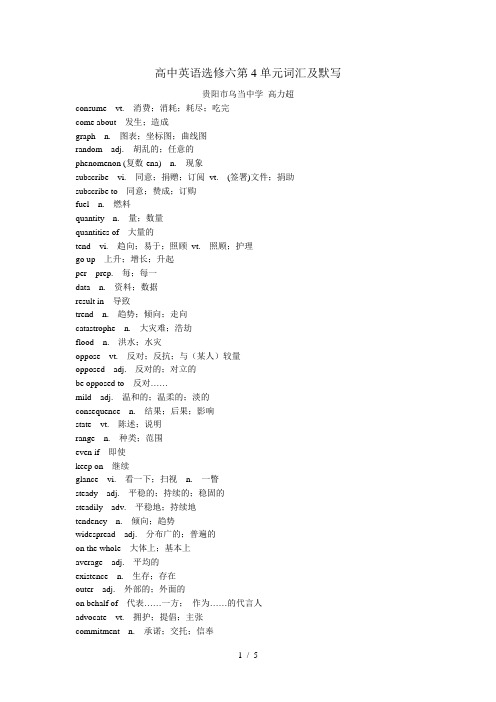
高中英语选修六第4单元词汇及默写贵阳市乌当中学高力超consume vt. 消费;消耗;耗尽;吃完come about 发生;造成graph n. 图表;坐标图;曲线图random adj. 胡乱的;任意的phenomenon (复数-ena) n. 现象subscribe vi. 同意;捐赠;订阅vt. (签署)文件;捐助subscribe to 同意;赞成;订购fuel n. 燃料quantity n. 量;数量quantities of 大量的tend vi. 趋向;易于;照顾vt. 照顾;护理go up 上升;增长;升起per prep. 每;每一data n. 资料;数据result in 导致trend n. 趋势;倾向;走向catastrophe n. 大灾难;浩劫flood n. 洪水;水灾oppose vt. 反对;反抗;与(某人)较量opposed adj. 反对的;对立的be opposed to 反对……mild adj. 温和的;温柔的;淡的consequence n. 结果;后果;影响state vt. 陈述;说明range n. 种类;范围even if 即使keep on 继续glance vi. 看一下;扫视n. 一瞥steady adj. 平稳的;持续的;稳固的steadily adv. 平稳地;持续地tendency n. 倾向;趋势widespread adj. 分布广的;普遍的on the whole 大体上;基本上average adj. 平均的existence n. 生存;存在outer adj. 外部的;外面的on behalf of 代表……一方;作为……的代言人advocate vt. 拥护;提倡;主张commitment n. 承诺;交托;信奉put up with 忍受;容忍pollution n. 污染;弄脏growth n. 增长;生长electrical adj. 电的;与电有关的so long as 只要casual adj. 随便的;漫不经心的;偶然的an so on 等等motor n. 发动机can n. 容器;罐头circumstance n. 环境;情况microwave n. 微波炉;微波refresh vt. 使恢复;使振动educator n. 教育工整理;教育家contribution n. 贡献presentation n. 显示;演出nuclear adj. 核的;核能的;原子核的disagreement n. 分歧;不一致默写英语vt. 消费;消耗;耗尽;吃完发生;造成n. 图表;坐标图;曲线图adj. 胡乱的;任意的n. 现象vi. 同意;捐赠;订阅vt. (签署)文件;捐助同意;赞成;订购n. 燃料n. 量;数量大量的vi. 趋向;易于;照顾vt. 照顾;护理上升;增长;升起prep. 每;每一n. 资料;数据导致n. 趋势;倾向;走向n. 大灾难;浩劫n. 洪水;水灾vt. 反对;反抗;与(某人)较量adj. 反对的;对立的反对……adj. 温和的;温柔的;淡的n. 结果;后果;影响vt. 陈述;说明n. 种类;范围即使继续vi. 看一下;扫视n. 一瞥adj. 平稳的;持续的;稳固的adv. 平稳地;持续地n. 倾向;趋势adj. 分布广的;普遍的大体上;基本上adj. 平均的n. 生存;存在adj. 外部的;外面的代表……一方;作为……的代言人vt. 拥护;提倡;主张n. 承诺;交托;信奉忍受;容忍n. 污染;弄脏n. 增长;生长adj. 电的;与电有关的只要adj. 随便的;漫不经心的;偶然的等等n. 发动机n. 容器;罐头n. 环境;情况n. 微波炉;微波vt. 使恢复;使振动n. 教育工整理;教育家n. 贡献n. 显示;演出adj. 核的;核能的;原子核的n. 分歧;不一致consume come about graph random phenomenon subscribe subscribe to fuel quantity quantities of tendgo upperdataresult in trend catastrophe flood oppose opposedbe opposed to mild consequence staterangeeven ifkeep on glance steady steadily tendency widespread on the whole average existence outeron behalf of advocate commitment put up with pollutionelectricalso long ascasualan so onmotorcancircumstancemicrowaverefresheducatorcontributionpresentationnucleardisagreement友情提示:部分文档来自网络整理,供您参考!文档可复制、编制,期待您的好评与关注!。
人教新课标英语选修六unit4重点短语、句子

人教新标英语选修六unit4重点短语、句子Unit4GlbalaringIPhrasesglbalaring全球气候变暖2asupplf/suppliesf大量的3dependn依靠4huanativit人类活动anaturalphenenn自然现象6betrappedin被困在……7aquantitf/quantitiesf+n大量的8resultin导致resultfr原因是9asaresult=innsequene因此asaresultf=innsequenef由于…的缘故0buildup逐渐建立1eepn保持2aeadifferene有影响;有关系aendifferene对……没有影响;不重要3putupith…忍受4as/slngas只要andsn等等6glaneat…很快地看……一眼7nthehle大体上8pare…t/pare…ith与…相比9eabut发生earss偶遇;穿过eba回来edn降下;减低ein进来;到达eut出来;出版eup上来;被提出讨论;发芽eupith追上;赶上et结果达到;苏醒20heatup受热21upt多达;比得上22intheearsahead今后一些年里23arrut执行24dereaseb下降了……dereaset(从……)下降到2greenhuseeffet温室效应‘IISentenesThatprbabldesn’tsundveruhturtebutitisarapidinreaseparedtstnaturalh anges这对你我来说很可能是无所谓的,但是跟多数自然变化相比较而言,这却是一种快速的增长。
2Thereisndubtthattheearthisbeingarerbutthereisfiere debateverhetheritishuanativitthathasausedthisglbala ringrhetheritisustanaturalphenenn毋庸质疑的是地球正在变暖,但关于它变暖的原因是由于人类活动所致还是一种自然现象还存在激烈的争论。
高中英语知识点总结选修6Unit4核心单词oppose
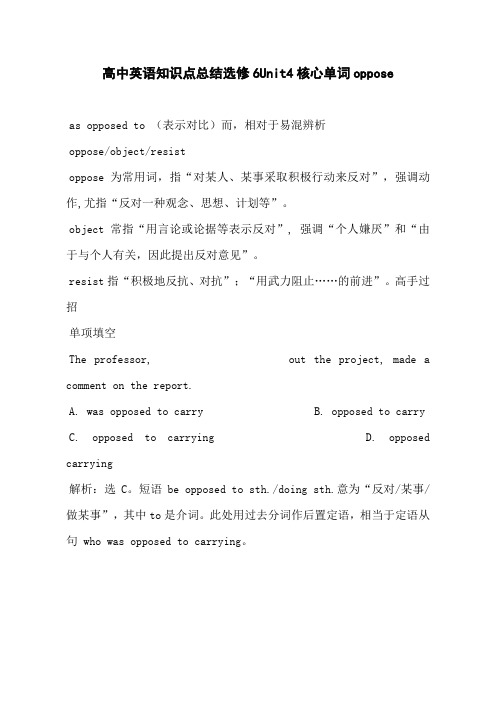
高中英语知识点总结选修6Unit4核心单词oppose
as opposed to (表示对比)而,相对于易混辨析
oppose/object/resist
oppose 为常用词,指“对某人、某事采取积极行动来反对”,强调动作,尤指“反对一种观念、思想、计划等”。
object 常指“用言论或论据等表示反对”, 强调“个人嫌厌”和“由于与个人有关,因此提出反对意见”。
resist指“积极地反抗、对抗”;“用武力阻止……的前进”。
高手过招
单项填空
The professor, out the project, made a comment on the report.
A. was opposed to carry
B. opposed to carry
C. opposed to carrying
D. opposed carrying
解析:选C。
短语be opposed to sth./doing sth.意为“反对/某事/做某事”,其中to是介词。
此处用过去分词作后置定语,相当于定语从句 who was opposed to carrying。
选修6 unit 4 单词
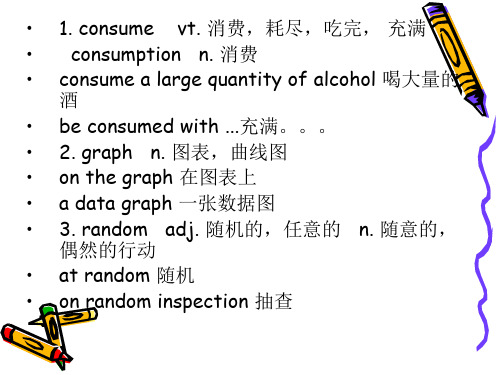
• 8. casual adj. 随便的,漫不经心的,偶然 的
• a casual manner 漫不经心的样子 • be casual about...对。。。抱着随意的态度 • a casual attitude towards...对。。。漫不经
心的态度
• 9. motor n. 汽车,马达,发动机 • 10. can n. 罐头,金属或塑料容器, vt.
体质
• build sb./ oneself up 增强某人的体质,使 更加强壮
• build on 在。。。基础上发展 • 6. keep on 继续 • keep (on) doing sth. 持续做某事 • keep up with 跟上,不落后,赶上 • keep up 继续,坚持,保持,维持 • keep off 推迟,避开,挡住 • keep from 阻止,隐瞒,使不做某事
(to 为介词) • There is a tendency (for sb. ) to do sth. 某人有
做某事的倾向
• have a tendency to do sth. 有可能做某事 8. per prep 每一 per hour/day/week/ night 9. trend n. 趋势,走向 • a trend towards......的趋势
就算,哪怕
• even though 引导的从句是真实的,意为尽管,虽 然
• 9. on the whole 大体上,基本上 • generally (speaking)/ in general 通
常,总的来说
• in a word 总之 • as a whole 作为一个整体,总体上
• 1. individual n. 个人,个体 adj. 单 独的,个别的
高中英语选修六--Unit 4

单词1.consume v.消费,消耗;吃完;喝光Each year Americans consume a high percentage of the world's energy.每年美国人都消耗掉世界能源的很大比例。
This will consume his health, destroy his temper.这将损害他的健康,毁坏他的情绪。
How many rice did you consume last year?去年你们吃了多少大米?拓展:consumer n.消费者,用户,消费品consumer goods (家用)消费品consumers' association 消费者协会consumption n. 消费(量),消耗(量)timeconsuming adj. 耗费时间的consuming adj. 消费的;强烈的例句:The ancient consumer city was now turned into a modern industrial base. 这个古老的消费城市今天已经变成了一个现代化的工业基地。
It's vital to impress the consumer with a good advertising campaign.进行广告宣传,使消费者熟悉产品,是至关重要的。
He has to cut down on the consumption of meat.他不得不减少吃肉。
Basketball is his consuming passion.篮球令他着迷。
练习:用consume的适当形式填空①We should adopt the ____________ suggestion.②Industrialized countries are _____________ 70% of the world's energy.③We have measured the car's fuel _____________.④She _____________ the big cake.Consumers’consuming consumption consumed2.subscribe vt.&vi.(1)捐助;捐赠He subscribed a large sum of money to charities.他向慈善团体捐赠了一大笔钱。
选修六 Unit4 单词

quantity 量;数量 许多的;大量的 a quantity of +cn/un(谓动单数) quantities of +cn/un(谓动复数) A large quantity of food is needed in the flood area. Large quantities of food are needed in the flood area.
如:
His stomachache resulted from his eating too much.
as a result= as a consequence/ in consequence/consequently 结果;因此 as a result of = as a consequence of =in consequence of 作为……的结果;因为……
in quantity/in large quantities
大量地
in small quantities 少量地
information stored in this computer. A. Large quantities of; have been B. A great many; has been C. A large quantity of; were D. Quite a lot; is
His average result of the three subjects is 96. average of 4 and 8 is 6. The_________ 4和8的平均数为6。 Tom’s work at school above the average 在平均水 is________________( 平以上) .
高中英语选修六unit4知识点汇总
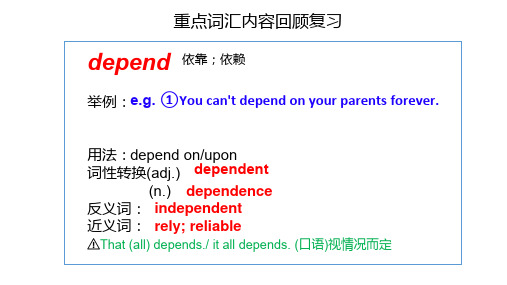
depend 依靠;依赖
举例:e.g. ①You can't depend on your parents forever.
用法:depend on/upon 词性转换(adj.) dependent
(n.) dependence 反义词: independent 近义词: rely; reliable ⚠️That (all) depends./ it all depends. (口语)视情况而定
重点词汇内容回顾复习
heat v.
用法: heat up 是某物变热或变暖 词性转换(adj.): heated adj. 热的激烈的
heatedly adv.愤怒地激昂地 heater加热器发热器
举例: heated debate, heated discussion
重点词汇内容回顾复习
consume v. 消耗,花费;耗尽
重点词汇内容回顾复习
random adj.
举例:I put these books randomly on the shelf.
词性转换(adv.):randomly=at random
重点词汇内容回顾复习
phenomenon n.
复数: phenomena
举例:
① the phenomena of nature ②a social phenomenon
用法: depend on/upon sb. to do sth. 指望某人做某事 depend on/upon +it +that…. 指望….. depend on/upon +wh-从句
重点词汇内容回顾复习
light
1)n. 光,线,灯 2)v.照亮,点燃-----lit(lighted)-----lit(lighted) 3)adj. 轻的
选修六unit 4词汇讲解课件

3.subscribe v. 捐款;订阅;签署(文件);赞成
subscriber n. 订户;签署者;捐献者
subscribe for 预订,订阅;捐款,捐助;认购 subscribe to 对……捐款;订阅(报刊);同意,赞成 辨析:agree,approve与subscribe 这些动词均含“同意、赞同”之意。具体区别如下:
体区别如下:
(1)use“用”,“使用”。普通用语。指事物时有消 费的意义,指人时,对这个行动表示强烈的不赞成。如: The company now uses a computer to do all its accounts. 该公司现在使用一台电脑处理一切账目。
(2)consume“用”。表示用尽,耗尽,指用在自己身 上。如:
put away 把……收起来,放好
put forward 提出,向前拨
14.so/as long as只要(引导条件状语从句) (1)与so/as long as同义的引导条件状语从句的连词还
有:on condition that,provided(that),providing(that),
only if,if等。 (2)as long as还有“与……一样长”之意。
(2)at a glance 一眼;立刻
at first glance 乍一看;乍看之下
take/have a glance at 匆匆看一眼 steal a glance 偷偷看一眼
① At first glance ,the place seemed deserted. 乍一看,这地方似乎被废弃了。
个别的或引起兴趣的consequence of/in consequence of(=as a result of)
人教高中英语选修六Unit 4--知识点 +句型

in no circumstances 决不 under any circumstances
在任何情况下;无论如何
[教材30原句] Plant trees in your garden or your school yard, as they absorb carbon
dioxide from the air and refresh your spirit when you look at them.在你的花园或学校的
be opposed to sth/ doing sth 反对…; 与…相对
= be against, object to, disagree with
oppose vt. 反抗 作对 对抗
oppose...doing sth. 反对做...
opposed adj. 反对的 对立的 对抗的
as opposed to (表对比)而,相对于
所有这些都将使人类的生活更好。
range n. 一系列;种类;范围; 山脉 v. 变化;排列;包括
a wide range of 大范围的;多种多样的 range from ...to... 范围从…到... range in age/size/price 年龄/尺寸/价格变动
[教材27原句] Glance quickly at the magazine article and answer the
[教材P29原句] Low-lying countries feel their very existence is in danger from rising sea levels. 地势低洼的国家感到它们的生存正受到海平面上升的威胁。
existence n. 存在 生存
高中英语 选修6 词汇表(人教版)

高中英语选修6词汇表(新课标人教版)Book 6 Unit 1realistic/riə’lɪstɪk/ adj.现实的abstract/'æbstrækt/adj。
抽象的n. 摘要sculpture /'skʌlptʃə/ n。
雕塑sculptor/’skʌlptə/ n。
雕刻家gallery /'ɡælərɪ/ n. 画廊faith /feɪθ/ n. 信任;信心;信念faithfully /'feɪθfəli/ adv. 忠实地consequently /’kɔnsikwəntli/ adv. 所以;因而aim /eɪm/ n. 目标;目的v. 瞄准conventional/kən’venʃənl/ adj.传统的typical /’tɪpɪkl/adj。
典型的evident /’evɪdənt/ adj. 明显的renaissance /riˌneisns/ n.新生;复兴the Renaissance 文艺复兴(时期)adopt /ə’dɒpt/ vt。
采用;收养humanistic /ˌhju:mə’nɪstɪk/ adj.人道主义的possess /pə’zes/ vt. 拥有possession /pə’zeʃn/ n.(尤作复数)所有;财产superb /ˌsu:’pə:b/ adj。
极好的perspective/pə’spektɪv/n.观点technique /tekˌni:k/ n。
技术;方法coincidence /kəʊˌɪnsɪdəns/ n. 巧合by coincidence 巧合地masterpiece /‘mɑ:stəpi:s/ n. 杰作a great deal 大量shadow /’ʃædəʊ/ n。
阴影;影子ridiculous /rɪ'dɪkjʊləs/ adj。
荒谬的controversial /ˌkɒntrə'və:ʃl/adj。
选修6unit4单词及知识点

易混淆词汇辨析
Impoverish vs. Deplete
• “Impoverish”指使贫困或枯竭,强调经济或资源的缺乏;而“deplete”则指耗尽或减少,可用 于各种资源或能量。
易混淆词汇辨析
Pertinent vs. Relevant
• “Pertinent”强调与主题或讨论直接相关,而“relevant”则更广泛地指与某事物有关或重要。
词汇拓展与例句
• 例句
Years of war had impoverished the country.
• 拓展
deplete, exhaust, impoverish
词汇拓展与例句
• 例句
It's pertinent to mention that we need more funds for the project.
• 例句
Smoking is detrimental to your health.
• 拓展
harmful, damaging, adverse
易混淆词汇辨析
Alleviate vs. Mitigate
• “Alleviate”强调减轻痛苦或紧张,而“mitigate”更偏向于缓和或降低严重 程度。
选修6unit4单词及知识点
目录
• 单词概览与重点词汇 • 知识点梳理与解析 • 听力训练与技巧指导 • 口语表达能力提升 • 阅读理解策略探讨 • 写作技能培养与实践
01 单词概览与重点词汇
本单元核心词汇
alleviate:减轻,缓解(痛 苦、紧张等)
impoverish:使贫困,使枯 竭
02
01
pertinent:相关的,切题的
选修六第三第四单元 重点词汇

大批量的 in quantity
a quantity of +
可数名词复数 不可数名词
谓语动词用复数 谓语动词用单数
quantities of +
可数名词复数 谓语动词用复数
不可数名词
e. g. Quality matters more than quantity. 质量比数量重
3、be used for 被用于
被用作某物
be used as sth.
习惯于做某事
be/ get used to doing sth.
过去时常/ 曾做某事 used to do sth.
4、quantity n. 量;数量
大/ 少量 的
大/ 少量 地
a large/ small quantity of large/ small quantities of in a large/ small quantity
have an effect on
正在实行;有效
be in effect
实际上;事实上
in effect
开始起作用;开始产生效果 take effect
将某物付诸实施
put sth. into effect
开始生效;开始实施
come into effect
9、strengthen
v. (使)变强;加强
选修六 重点词汇
第三单元
1、abuse v. n. 虐待;滥用
滥用药物
drug abuse
滥用职权
abuse of power
容易被人钻空子 open to abuse
2、stress n. 压力;忧虑;紧张 stressed adj.焦虑的;紧张的 stressful adj.充满压力的;紧张的
选修6unit4单词及知识点

05.03.2021
Merry Chris精tm选a课s &件happy New
44
Year!
短语回顾
1.come _a_b__o_u__t_ 发生;造成 2.subscribe _to___ 同意;赞成;订购 3.a large quantity __o__f____ 大量的 4. put up _w_i_t_h__ 忍受;容忍 5.result __in___ 导致→result_f_ro__m_ 由于 6.be opposed _t_o___ 反对 7.___o_n__ the whole大体上;基本上 8.__o__n__ behalf of 代表
精选课件
6
8. Though Ann is less than one year old, she is strong enough to stand s_t_e_a_d_il_y(稳).
9. The tsunamis killing 125,000 people in 12 different countries was a terrible _c_a_ta_s_tr_o_p_h_e_(悲剧).
6. The _d_a_ta_(数据)shows that people count knowledge of more importance than before.
7. The food was enough in _q_u_a_n_tit_y_(数量), but not very good in _q_u_a_lit_y_(质量)
15. In no _c_ir_c_u_m_s_t_a_n_c_e_s(情况) will the theory that smoking can r_e_f_re_s_h_(使振作) you be accepted.
选修六第四单元_重点词汇

11、tendency
n. 倾向;趋势
做某事的倾向
……的趋势/ 倾向
a tendency to do sth.
tendency to/ for/towards
某人有做某事的趋势 there is a tendency for sb. to do sth.
12、widespread adj. 分布广的;普遍的
乍一看,最初想到的 at first glance
看,注视
怒目而视 盯着,凝视
look at
glare at
stare at
10、steady adj. 平稳的;持续的;稳固的,牢固的;不摇晃的
steadily adv. 平稳地;持续的
firm stable steady solid 坚固不可动摇或意志、信仰的坚定 根基牢固,平衡良好 保持平衡不动摇 (建筑物等)结实的,坚固的
• 6. I felt I did not have to make such a _____ (承诺) to them. • 7. Low lying countries feel their very _____ (存在) is in danger from rising sea level. • 8. This _____ (资料) was collected from 80 countries. • 9. Wood, coal, oil and gas are _____ (燃料 ). • 10. The contract clearly _____ (叙述) when the work should be finished. • 6. commitment 7. existence • 8. data 9. fuels 10. states
选修六unit 4词汇讲解课件
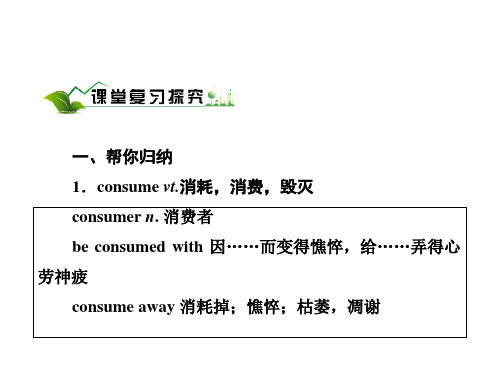
③She is so afraid of the big dog that she
it and can't
move a little.
stares at
她非常害怕这只大狗,一个劲地盯着它看,一动也不敢动。
④I caught a
of higslfiamcpesaes he ran past.
当他跑过去时,我瞥见了他的脸。
(3)subscribe 指完全地赞成已阐明的立场。多用于比 较愿意支持一种立场或为一种立场所辩护的情况。
提示:subscribe 表示“捐款;捐助”之意时,常与to, for连用;表示“同意,赞同”时,常与to连用。
4.quantity of 许多的;大量的 a quantity of 许多的;大量的 in large quantities 大量地 a large quantity of 大量的 in quantity 大量的 in large amount 大量地 提示:a large quantity of/quantities of后可以跟可数 名词也可跟不可数名词。如果该短语作主语,谓语动词的 单复数要依据quantity的单复数形式而定。
① At first glance ,the place seemed deserted.
乍一看,这地方似乎被废弃了。
②He
nervously his watch.
他紧张不安gl地an看ce了d 一下表。
at
glance,glare,stare,glimpse
(1)glance指很快地看某人或某物一眼。 (2)glare指怒视。 (3)stare指由于生气、好奇、害怕或吃惊而睁大眼睛注视某人 或某物。 (4) glimpse意为“瞥见”,强调结果。多用名词形式, catch/get a glimpse of“瞥见”。
- 1、下载文档前请自行甄别文档内容的完整性,平台不提供额外的编辑、内容补充、找答案等附加服务。
- 2、"仅部分预览"的文档,不可在线预览部分如存在完整性等问题,可反馈申请退款(可完整预览的文档不适用该条件!)。
- 3、如文档侵犯您的权益,请联系客服反馈,我们会尽快为您处理(人工客服工作时间:9:00-18:30)。
新课标高中英语选修6 Unit 4 核心词汇
选修6 Unit 4 Global warming
核心词汇
1. subscribe
vi. 同意;捐赠;订阅
vt. (签署)文件;捐助
常用结构:
subscribe to ... 同意,赞许;(在文件等下面)签名,署名
subscribe sth. to ... 捐助
subscribe to/for ... 订阅;订购(书籍等)
He did not subscribe to my proposal.
他不赞同我的建议。
He subscribed a large sum to the relief fund.
他向救济基金捐赠巨资。
He subscribed his name to a petition. 他在请愿书上签名。
2. tend
vt. & vi. (常与to连用)有某种倾向;有……的趋势;走向;趋向;朝向;照管,照料;看护People under stress tend to express their full range of potential.
处于压力下的人容易发挥自己全部的潜力。
He tends to pitch the ball too high.
他往往把球掷得过高。
Prices are tending upward. 物价在上涨。
The woman stayed at home to tend her child.
那个妇女呆在家里照料她的孩子。
3. oppose
vt. 反对;反抗;对抗;(与to连用)使反对,使相对
Many members of the council opposed the building of the luxury houses in the centre of the city.
许多议会议员反对在市中心建造豪华型住宅。
My mother is opposed to the new plan.
我妈妈是反对这个新计划的。
Many residents are opposed to the plan of building the motorway.许多居民反对修建那条高速公路的计划。
常用结构:
as opposed to (表示对比)而,相对于
易混辨析:oppose/object/resist
oppose 为常用词,指“对某人、某事采取积极行动来反对”,强调动作,尤指“反对一种观念、思想、计划等”。
object 常指“用言论或论据等表示反对”, 强调“个人嫌厌”和“由于与个人有关,因此提出反对意见”。
resist指“积极地反抗、对抗”;“用武力阻止……的前进”。
4. consequence
n.[C]结果;后果;影响
I’m quite willing to accept the consequences.
我完全愿意承担后果。
You should know the consequence of not studying hard.
你应该知道不用功学习的后果。
This had the unexpected consequence that he got fired.
这件事有了意外的后果,那就是他被革职了。
常用结构:
as a consequence (of ...)
=in consequence (of ...)
=as a result (of ...) 结果;因此;由于……的原因
联想拓展
consequent adj.(+on/upon)因……而起的;随之发生的consequently adv. 结果;因此;必然地
5. average
adj. 平均的;普通的
n. 平均;平均数
The average age of the boys in this class is fifteen. 这个班男生的平均年龄为十五岁。
It was an average piece of work.那是一件普通的作品。
The average man is not interested in this subject.
普通人一般对这个题目不感兴趣。
常用结构:
on average 平均地;通常
above/below average 高于/低于平均数/水平
an average of ... ……的平均数
up to average 达到平均数
The average of 4 and 8 is 6. 4 和8的平均数为6。
Two students are absent each day on average.
平均每天有两个学生缺席。
6. blame
v. 埋怨,责备
常用结构:
be to blame 应受谴责,应负责任
blame something on sb. 把……归咎于
blame sb. for sth./doing sth. 因……而责备某人
City residents also blame migrant workers for the sharp rise in the urban crime rate. 城市居民还责怪民工造成了城市犯罪率的大幅度上升。
They blamed the failure on George. 他们把失败归咎于乔治。
Blame me if I don’t. 我要是不这样做,随你怎么办好了。
联想拓展
blameful adj. 该受责备的,有过错的
blameless adj. 无可责难的,无过错的
blameworthy adj. 该受责备的。
